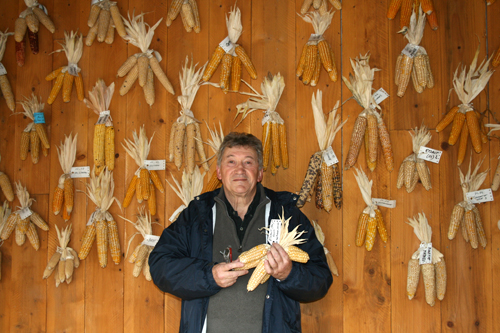Preservation of maize genetic ressources in France
In 1983 the INRA (National Institute for Research in Agriculture) and Pro-Maïs initiated, a common action supported by the Ministry of Agriculture and Forest to collect a large number of landraces,to study and preserve their genetic variability.
At present, a collection called « of network » including approximately 1300 varieties, is preserved and provided to members of the association.
Within this collection, a subset of all materials of French origin comprising 530 entries is established as « National Collection ».
This collection is made available internationally.: France being a signatory with 126 other countries of the International Treaty on Plant Genetic Resources for Food and Agriculture (ITPGRFA, Pro-Maïs,in agreement with INRA « notified » on March 24, 2009, the « Multilateral System (MLS) of this treaty of the French National Collection of 530 maize varieties.
Among these varieties, about 264 (having seed available) are « populations » or « landraces » collected in France. The rest of the collection includes Guadeloupe and La Reunion landraces, composites (mixtures of populations), synthetics (mixtures of inbreds) and inbred lines from INRA.

The varieties are preserved in two cold chambers managed by INRA of Montpellier for distribution, and in deep freezers for longer term preservation. The varieties are periodically multiplied in the field by INRA and the partner breeders. A minimum of 200 ears, from intercrossings 400 plants are used to create « balanced lots of seeds », that is,including the same number of kernels from each ear of all plants
The National Collection is available for free to the public.
- Genetic resources preservation processes
Since 1983, and thanks to a close collaboration of all private seeds companies with INRA of Montpellier, more than 1200 varieties are maintained, evaluated, classified, described and characterized.
- Provisionning to the public
- The 530 varieties of the National Collection of maize are available free of charge to the public. One can obtain samples of 100 kernels of each of up to 10 varieties each year.

